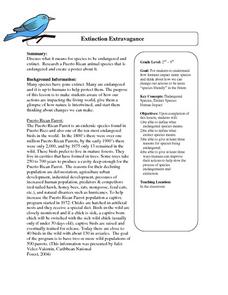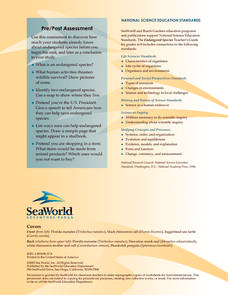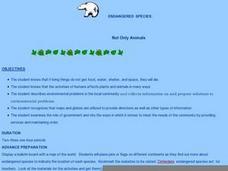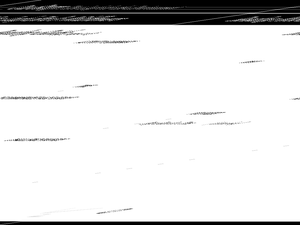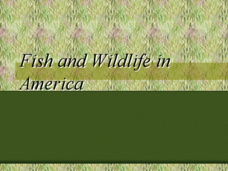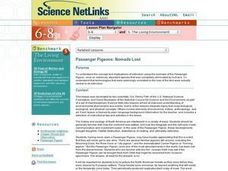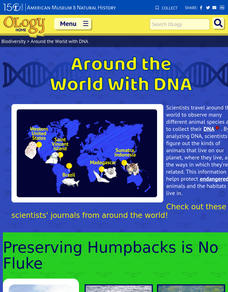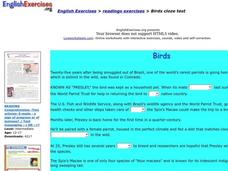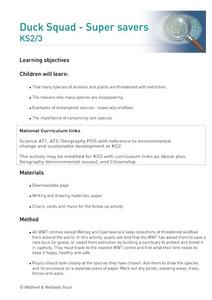Curated OER
Birds, Birds, Birds
Students explore one bird a day and eventually put together a book about each of the birds they learn.
Curated OER
Erase It! Endangered Animals
Students discover why many animals, insects, and birds are becoming extinct. They understand the importance of the food chain and how disturbing one area of it can cause havoc with wildlife. They discover how they can make a difference...
Curated OER
Extinction Extravagance
Students brainstorm and discuss what it means for a species to be considered endangered and/or extinct. They research animals in Puerto Rico and choose one that is considered endangered and create a poster about it. In addition, they...
Curated OER
Building a Bird's Nest
Students identify local birds and their habitats. In this wildlife lesson, students list various birds that live in their area and match the descriptions of the birds to the photos. Students build a diorama of a birds nest.
Curated OER
Where Has It Been? Tracking the Ivory-Billed Woodpecker
By studying the assumed extinction, and subsequent rediscovery of the Ivory-billed Woodpecker, learners use maps and come up with a scenario for the rediscovery of the bird. This incredibly thorough lesson plan is chock-full of...
Curated OER
Endangered Species
Students define extinction, name four animals and two plant species that are extinct, list three reasons why animals and plants become extinct, and create ways that would help prevent extinction.
Curated OER
Endangered species
Young scholars define the following words: extinction, endangered species, meteorite collision, glaciation and climate warming. They investigate that there are 307 species on the endangered list, and an average of 10-20 species are added...
Curated OER
Endangered Species: Not Only Animals
Young scholars research endangered animals and plants. In this biology lesson, students are read Will We Miss Them? Endangered Species by Alexandra Wright before they begin searching for information to complete an endangered species...
Curated OER
Reading Miss Lady Bird's Wildflowers
Students discover the impact "Lady Bird" Johnson had on America by reading a short biography. In this historical persons lesson, students read a multi page biography of the former first lady and write a summary of her life's work....
Curated OER
Fish and Wildlife in America
Some of the details of the use of wildlife as food and crop resources are given at the beginning of this slideshow. Next, the historical problems with wildlife are explained, as are some mistakes that have been made leading to extinction...
Curated OER
Evaluating the Strength of Scientific Evidence: The Rediscovery of the Ivory-billed Woodpecker
A happy discovery occurred in Arkansas in 2004: a woodpecker, believed to be extinct since the 1940s, reappeared! Or did it? Middle to high school ecologists examine scientific evidence and use critical-thinking skills to determine...
Curated OER
PASSENGER PIGEONS: NOMADS LOST
Students explore the concept and implications of extinction using the example of the Passenger Pigeon, once an extremely abundant species that was completely eliminated by humans.
Curated OER
Wild Where?
Students investigate why the urban environment is considered a hostile environment; define the concept of endangered species; describe and identify a Peregrine Falcon; describe and identify the eating habits of the Peregrine Falcon.
Curated OER
Sustainability and Extinction
Galapagos Penguins are the only penguins on earth that live north of the equator (in the wild). In this last lesson plan a discussion on how the Galapagos islands developed their populations and diversity sparks the introduction. Two...
Curated OER
Extinct Animals Of The Louisiana Purchase
Students investigate two extinct species of birds that existed during the time of the Louisiana Purchase in Arkansas. They conduct research to describe the characteristics of the bird and look for the causes for its eventual extinction.
American Museum of Natural History
Around with World with DNA
A mammalogist, ornithologist, ichthyologist, and a conservation geneticist share their work and their hopes that their research will help protect and save endangered species and their habitats.
Channel Islands Film
Santa Cruz Island Restoration Narrative
What would you be willing to do to save an animal from extinction? After re-viewing a video about the restoration of the Island Fox on Santa Cruz Island, individuals adopt the point of view of one of the key players in the debate and...
Curated OER
Birds
In this birds worksheet, students choose the correct words to complete sentences about birds and complete a word search. Students complete 2 activities.
Curated OER
Duck Squad-Super Savers
Students "save" a rare duck (or goose, or swan) from extinction by "building" a sanctuary to protect and breed it in captivity. They research what the bird needs and draw the species and its enclosure.
Curated OER
Animal Survival
Viewers of this PowerPoint are introduced to endangered and extinct animals. They discover why apes, elephants, pandas, polar bears, rhinoceri, and marine turtles are threatened. Finally, ways that humans have and can make a difference...
Curated OER
Present-Day Rapid Extinctions
For this extinction worksheet, learners review the different human activities that are leading to present-day rapid extinctions. This worksheet has 9 short answer questions.
Curated OER
Endangered Relationships
Students study the interrelationship between the horseshoe crab and red knot. In this ecology lesson, students explain why several species became extinct. They research about endangered species found in their region.
Curated OER
Ecology Community Status
In this ecology community status worksheet, learners research their state's ecosystem, make a chart of the biodiversity, analyze the chart and identify issues with wetland species. This page has several links to helpful web resources.
Curated OER
Sunken Lesson: Animal Adaptation
This animal adaptation PowerPoint provides definitions and photographs of vocabulary related to how the animals that live in particular biomes protect themselves. It also explains the cause/effect relationship between the inability of...




